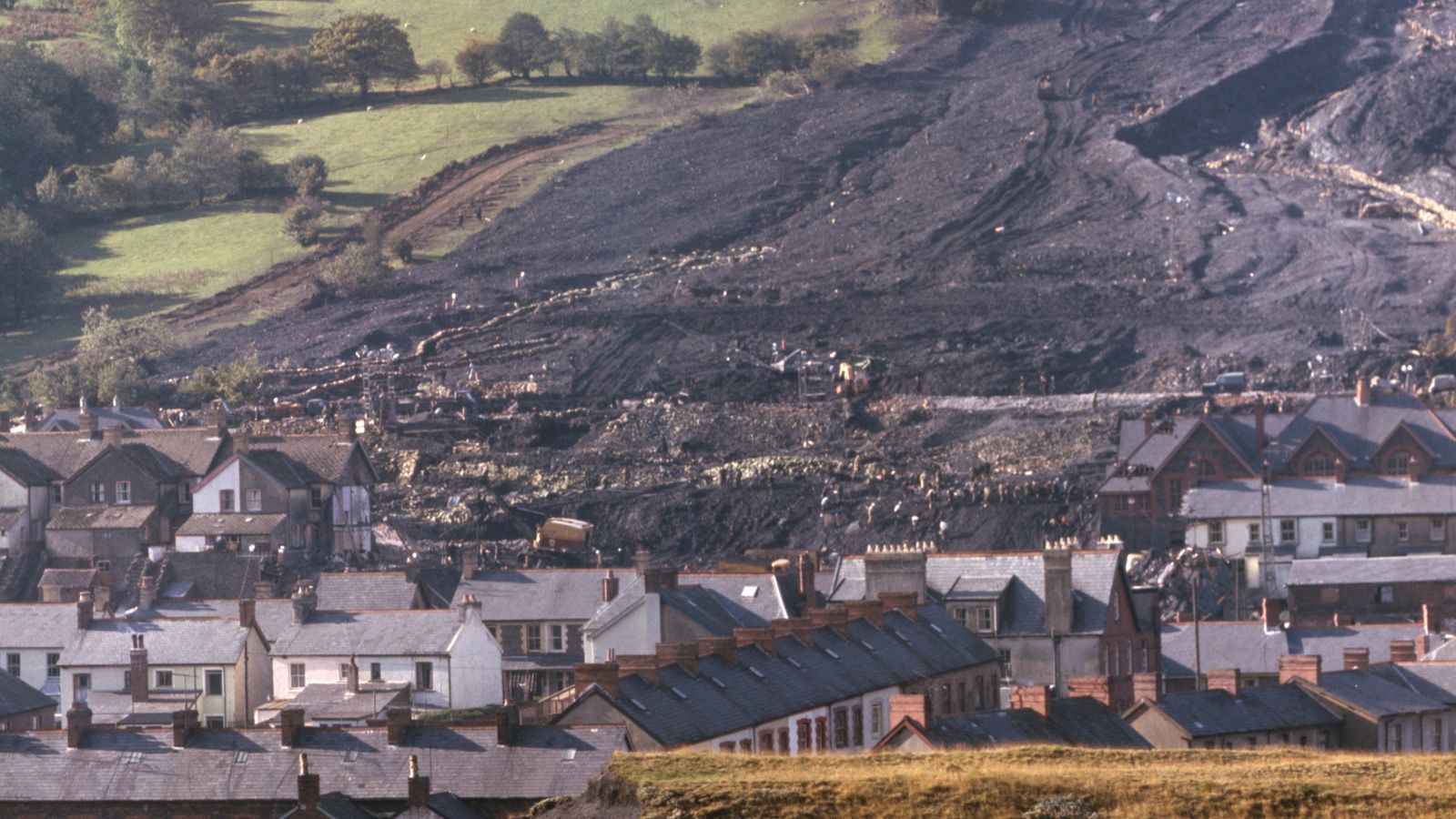The Welsh government says climate change could increase the risk of landslides from disused coal tips – and is calling on the UK government to allocate funds to make hundreds of high-risk tips safe.
The devolved administration wants more than half a billion pounds from the UK to carry out work on more than 320 high-risk coal tips across Wales.
Wales’ finance minister says if more money isn’t allocated in next week’s Spending Review, it will have to look again at funding for school and hospital projects.
The call comes on the 55th anniversary of the Aberfan disaster, which left 144 people dead, including 116 children, when a coal tip landslide engulfed a classroom at Pantglas Junior School on 21 October 1966.
A Welsh government spokesperson said: “The recent UK Climate Change Committee Impact Assessment says there will be an increase in rainfall intensity as our climate changes.
“In Wales, this could increase the risk of future landslips, landslides and subsidence in the many old coal tips we have as a result of our industrial past.
“We are disproportionately affected by the legacy of coal mining and we are working hard to make sure communities living in the shadows of these tips are protected.”
Boy, 14, appears in court charged with murder of five-year-old Logan Mwangi found in Bridgend river
Clydach murders: Blood-stained sock links David Morris to scene of killings, police say
Emiliano Sala: Man who organised footballer’s flight goes on trial
It says because the whole of the UK benefited from coal mined in Wales, the cost of remediating the tips should not solely be the responsibility of the Welsh government.
There are around 2,500 disused coal tips in Wales – 40% of the UK total.
The tips contain thousands of tonnes of coal waste tipped from wagons and lorries when mining was active.
In February 2020, 60,000 tonnes of coal waste slid down a hillside in the village of Tylorstown during Storm Dennis.
Fortunately, no one was injured, but local councillor Robert Bevan, himself a former miner, says it had a big impact on the community.
“While these tips remain, that concern, anguish and anxiety will be ever-present in the community,” he said.
“It’s something that we’ve lived with, because of the legacy of coal-mining and what happened at Aberfan, we’ve always had it in the back of our minds: ‘how safe are the tips in our communities?’ and that’s why we should deal with it as quickly and as safely as possible.”
It’s a worry reflected by local Marsha Lewis, who lives in a house close to the landslide.
She said: “It was a shock. I was quite upset over it really. Nothing is stable around here. No debris from the pits is stable around here. So really something has to be done, the sooner the better. It’s always in the back of your mind.”
The Welsh minister for finance and local government, Rebecca Evans, is calling on the UK chancellor, Rishi Sunak, to allocate extra funding in the Spending Review on 27 October.
She told Sky News if funding isn’t provided, the money may have to come from elsewhere.
She said: “The Welsh government will have to look again at its budgets and consider where we have to divert funding from in order to manage the commitments to making coal tips safe, so we’d have to look again at school programmes, road maintenance, plans for hospital buildings and so on – so there are real-life implications of the UK government not stepping up to the plate here.”
A UK government spokesperson said it provided Wales with £9m in December 2020 to go towards repairs to vulnerable coal tips, but ultimately the issue is devolved and not one the UK government would expect to provide additional funding for.
The spokesperson said: “The Welsh government is more than adequately funded to manage the costs of devolved responsibilities. Their 2021-22 spending review settlement provides around £123 per person for every £100 of equivalent funding in England. This is around £1bn more than the agreed level of fair funding for Wales relative to England as set out in the fiscal framework.”
The argument over who should pay comes as those living in the Welsh town of Aberfan remember those who died 55 years ago.
Jeff Edwards, 63, was eight years old when he walked into the school moments before a coal tip landslide hit the classroom.
“The building started to shake, the next thing I remember was waking up with all this material above me and there was a dead girl on my left shoulder,” he said.
“Effectively my childhood ended then. The majority of children in my class died, so there were no friends to play with after that and obviously, it was the psychological injuries that occurred and the guilt of being alive compared to those who had died was a huge burden to bear and still is to a certain extent today.”
Mr Edwards says he supports the Welsh government in trying to secure funds from the UK to make the remaining coal pits safe.
He added: “The effect on communities is absolutely devastating. You don’t want another disaster to be the cause to secure additional funds – I think they should look logically at these issues.”






















